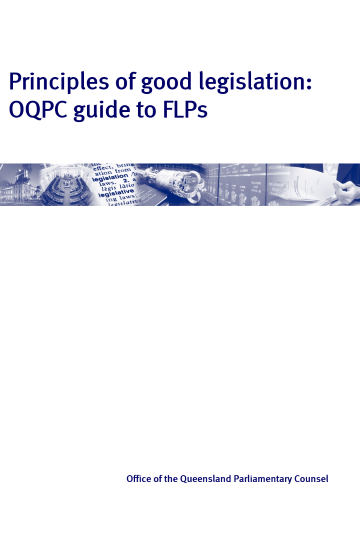You are here:
Fundamental legislative principles
Queensland legislation is required by law to have regard to the fundamental legislative principles, commonly referred to as FLPs. They are set out in the Legislative Standards Act 1992, which defines fundamental legislative principles as the principles relating to legislation that underlie a parliamentary democracy based on the rule of law.
More specifically, section 4 of the Legislative Standards Act 1992 states that the FLPs include requiring that legislation has sufficient regard to—
- rights and liberties of individuals
- the institution of Parliament.
Legal status of FLPs
The fundamental legislative principles are not rules of law. Instead, they are guiding principles to be observed in drafting legislation. Having regard to FLPs when legislation is being prepared is a way of ensuring the legislation is of the highest standard.
Sometimes, the application of an FLP must be altered to achieve important policy objectives in the community interest. In these circumstances, departures from the principles can be justified with sound reasoning.
Examples of FLPs
Section 4 of the Legislative Standards Act 1992 lists examples of issues that may be considered in assessing whether particular legislation has sufficient regard to the rights and liberties of individuals and the institution of Parliament. Here are some of the examples listed in that section.
This guide is a resource prepared by OQPC about FLPs and their application in Queensland legislation.
Whether legislation has sufficient regard to the rights and liberties of individuals depends on whether, for example, the legislation—
- makes rights and liberties, or obligations, dependent on administrative power only if the power is sufficiently defined and subject to appropriate review
- is consistent with principles of natural justice
- does not adversely affect rights and liberties, or impose obligations, retrospectively
- has sufficient regard to Aboriginal tradition and Island custom
- is unambiguous and drafted in a sufficiently clear and precise way.
Whether legislation has sufficient regard for the institution of Parliament depends on whether, for example, the legislation—
- allows the delegation of legislative power only in appropriate cases and to appropriate persons
- sufficiently subjects the exercise of a delegated legislative power to the scrutiny of the Legislative Assembly
- for subordinate legislation, is within the power that allows the subordinate legislation to be made
- also, for subordinate legislation, contains only matters appropriate to subordinate legislation.
How is regard had to FLPs in Queensland legislation?
The process of developing legislative proposals into Queensland law includes assessing the proposals against FLPs during the policy development, drafting and parliamentary processes. The process is designed to ensure that fundamental legislative principles underpin Queensland legislation and that departure from the principles is explained and justified.
When new legislation is proposed, the sponsoring department is required to identify FLP issues that may arise. When the legislation is drafted, OQPC works with that department to ensure the legislation is consistent with the FLPs and the values from which they are derived.
Explanatory notes must accompany a Bill when it is introduced into Parliament or subordinate legislation when it is made. See the Legislative Standards Act 1992, part 4. The explanatory notes must include a brief assessment of the consistency of the legislation with the FLPs and, if it is inconsistent, the reasons for the inconsistency. The explanatory notes are published with the Bill or subordinate legislation on the Queensland Legislation website.
Legislation is then examined by a committee of members of the Parliament, known as a portfolio committee. Among the matters a portfolio committee must consider and report to the Parliament about is the application of FLPs to the legislation. For a Bill, this examination occurs after the Bill has been introduced to Parliament but before it has been debated. Subordinate legislation is examined by a portfolio committee after it has been made and tabled in Parliament. See the Parliament of Queensland Act 2001, section 93.


